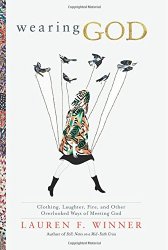
 Wearing God
Wearing GodClothing, Laughter, Fire, and Other Overlooked Ways of Meeting God
Review posted July 16, 2015.
HarperOne, 2015. 284 pages.
Starred Review
2015 Sonderbooks Stand-out: #2 Other Nonfiction
This is a lovely book that challenged my thinking and opened my mind. I read it a little bit at a time, then finished the last few chapters during the 2015 48-Hour Book Challenge. In a way it was a shame to finish off the end quickly, since I liked the daily dose of thinking about God in new ways.
In this book, Lauren Winner looks at metaphors found in the Bible about God -- but which the church doesn't talk a lot about. Or at least the modern church. She did find writings from years past about each of the figures of speech.
She looks at God as clothing, God as scent, God as bread and vine, God as a laboring woman, God as one who laughs, and God as flame. All of these metaphors are found in Scripture, and all have something to offer us today.
I've been a church-goer all my life, and I enjoyed hearing things I hadn't heard before. I enjoyed having a different light cast on my thinking about God.
Here are some of the author's words in the introductory chapter:
The Bible has a great deal to say about this. Your church might primarily describe God as king, or light of the world, or ruler of all. In my church, we tend to call God Father, or speak of God as shepherd or great physician. When we are really going out on a limb, we pick up Matthew and Luke's avian image and pray to God the mother hen tending her brood. Most churches do this -- hew closely to two or three favored images of God, turning to them in prayer and song and sermons. Through repetition and association, these few images can become ever richer: there was once a time when I didn't have many thoughts or feelings about God as great physician, but now I have prayed to that God with Carolanne, whose husband is pinned down by Parkinson's, and Belle, who so much wants to keep this pregnancy, and Albert, who is dogged by depression, and because of those prayers, and the fears and hopes and miracles and disappointments they carry, God-as-physician seems a richer image than I first understood.
Yet the repetition of familiar images can have the opposite effect. The words become placeholders, and I can speak them so inattentively that I let them obscure the reality whose place they hold. I repeat them, I restrict my prayer to that small cupful of images, and I wind up insensible to them.
Unlike my church, with its four favored metaphors, the Bible offers hundreds of images of God -- images the church has paid a great deal of attention to in earlier centuries, although many are largely overlooked now. Drunkard. Beekeeper. Homeless man. Tree. "Shepherd" and "light" are perfectly wonderful images, but in fixing on them -- in fixing on any three or four primary metaphors for God -- we have truncated our relationship with the divine, and we have cut ourselves off from the more voluble and variable witness of scriptures, which depict God as clothing. As fire. As comedian. Sleeper. Water. Dog.
Here is her invitation to the reader:
In this book, we will explore several overlooked biblical idioms for God. We will look at what the Bible itself suggests about these idioms, and what our daily lives have to say about them, and what various preachers and pray-ers and writers from earlier eras made of them. Your guide in this exploration is a bookworm who can happily get lost for a few days on a research trail, and I sometimes bring the words of anthropologists or historians or literary critics to bear on our ruminations. (Since the library of insights from those who have gone before us, and from contemporary scholars and preachers, is so rich, I have set additional gems at the bottoms of many pages. These quotations are there for stimulation and contemplation. Feel free to stop and linger over them, or skip them, or add your own musings.) Because I hope the book will help you sit down with God in a place the two of you have never visited before, each chapter concludes with a prayer. The final aim of this book is not to persuade you to stop thinking about God as your shepherd and start thinking about God as a cardigan sweater or One who weeps. The aim, rather, is to provoke your curiosity, and to inspire your imagination, and to invite you farther into your friendship with God.
If that invitation sounds even a tiny bit enticing, I highly recommend that you spend some time with this book.
